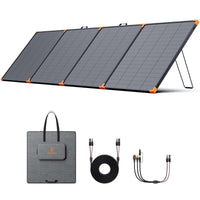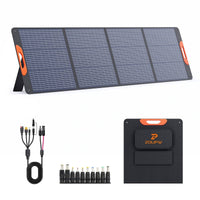Understanding Solar Panel Busbar: From 5BB to 16BB
When shopping for solar panels, you may have noticed terms like 5BB, 9BB, or 16BB in product descriptions. These numbers refer to busbar (BB) configurations—an important feature that affects panel performance, durability, and efficiency. But what exactly do these numbers mean, and why should you care?

Let’s break down the differences and explain how ZOUPW solar panels leverage advanced cell technology to deliver more efficient, longer-lasting, and smarter energy solutions.
🔍 What is a Busbar in a Solar Cell?
 A busbar is a thin metallic strip on a solar cell that conducts electricity collected by the photovoltaic (PV) material. Traditionally, solar panels had fewer busbars (like 3BB or 4BB), but modern solar panels are now equipped with more—like 5BB, 9BB, 12BB, or even 16BB—to improve performance.
A busbar is a thin metallic strip on a solar cell that conducts electricity collected by the photovoltaic (PV) material. Traditionally, solar panels had fewer busbars (like 3BB or 4BB), but modern solar panels are now equipped with more—like 5BB, 9BB, 12BB, or even 16BB—to improve performance.
Bus bars serve two key functions in solar cells:
Current Collection: Gather electrons from the cell’s finer gridlines and channel them to the panel’s wiring.
Structural Support: Reduce microcrack risk by distributing mechanical stress.
More bus bars shorten current pathways, lowering resistive losses, but they also block more sunlight. Thus, bus bar design balances efficiency gains against shading losses.
⚙️ Comparing Solar Panel Cell Types: 5BB to 16BB
| Cell Type | Description | Key Benefits | Best For |
|---|---|---|---|
| 5BB (5 Busbars) | Older standard, still reliable | Cost-effective, proven tech | Budget-friendly residential projects or low-irradiance regions. |
| 9BB / 10BB | Mid-generation update | Lower resistance, better shading tolerance | Commercial and industrial (C&I) projects prioritizing cost-effectiveness. |
| 12BB | Improved efficiency and reliability | Better power output in limited space | Utility-scale plants or high-efficiency panels |
| 16BB (N-Type) | Latest technology (used in premium ZOUPW panels) | Higher conversion efficiency, lower energy loss, excellent low-light performance | Utility-scale plants or high-efficiency panels |
As busbar count increases, electrical resistance drops, which reduces power loss and boosts panel efficiency—especially in partial shade or less-than-ideal conditions.
Key Advantages of Multi-Busbar (MBB) Technology
Compared to 5BB, MBB designs (9BB and above) deliver:
| Higher Efficiency |
Narrower bus bars reduce shading, improving light absorption by 0.3–0.5%. Shorter current paths cut resistive losses by 30–50%. |
| Enhanced Reliability |
Stress distribution lowers microcrack risk by 20% (PVEL Testing). Redundant current paths maintain output if a bus bar fails. |
| Advanced Compatibility |
Optimized for bifacial, half-cut, and shingled cells. Paired with N-type TOPCon/HJT cells, efficiency exceeds 23.5%. |
🌞 Why ZOUPW Uses 10BB–16BB Technology
 At ZOUPW, we focus on high-efficiency solar panels for camping, RVs, off-grid living, and home backup. Our N-Type 16BB models, like the powerfold portable panels, offer up to 25% conversion efficiency—significantly outperforming lower-BB models. With better durability and longevity, they’re ideal for users who demand maximum power in a compact, rugged design.
At ZOUPW, we focus on high-efficiency solar panels for camping, RVs, off-grid living, and home backup. Our N-Type 16BB models, like the powerfold portable panels, offer up to 25% conversion efficiency—significantly outperforming lower-BB models. With better durability and longevity, they’re ideal for users who demand maximum power in a compact, rugged design.
🧭 Which Should You Choose?
-
For light use like charging phones, consider 5BB–9BB panels (e.g., 20W–100W models)
-
For moderate outdoor needs like camping fridges, go for 10BB–12BB
-
For high-demand or off-grid living, choose N-Type 16BB panels with reinforced construction and better temperature tolerance
❓FAQ
1. Do more bus bars extend panel lifespan?
Not directly. Lifespan depends on encapsulation (POE vs. EVA), but MBB reduces hot-spot failures.
2. Is a higher BB count always better?
Generally yes—more busbars mean lower resistance, better shading performance, and higher overall efficiency.
3. Do all ZOUPW panels use high-BB cells?
ZOUPW offers a variety—from 10BB in our compact camping panels to 16BB N-Type cells in our flagship high-efficiency models.
📌 Need help choosing the right solar panel for your setup? Explore our Solar Panel Collection or contact our support team—we’re here to help you go further, with smarter energy.
Share


